The 1961-62 NHL season saw Montreal finish atop the regular season standings with a 42-14-14 record for 98 points, well clear of the Toronto Maple Leafs in second with 85 points from a 37-22-11 mark. Third in the final standings were the defending Stanley Cup champion Chicago Black Hawks another ten points back at 75 after winning 31 and losing 26 along with 13 ties. The fourth and final playoff team was the New York Rangers at 26-32-12 with 64 points. The Detroit Red Wings at 60 points missed out on the postseason while the Boston Bruins with 38 points brought up the rear.
Unlike today's expected pairings with the top team taking on the lowest ranked team, in 1962 the #1 Canadiens were paired with the #3 Chicago Black Hawks, while the #2 Maple Leafs took in the #4 New York Rangers.
Chicago and Montreal began their series on March 27, 1962 in Montreal at The Forum. The Canadiens won Game 1 by a score of 2-1. On March 29th they again prevailed in a close contest by a score of 4-3 to take a 2-0 lead as the series moved to Chicago for Games 3 and 4.
Game 3, played on this date in 1962, saw the Stanley Cup on display at the Chicago Stadium in recognition of the Black Hawks championship from the previous season, their first in 23 years.
In attendance for the game was 25-year-old Ken Kilander from Montreal who had made the trip to Chicago. He often followed the Canadiens to road games, even traveling on the same train as the club, which made him a familiar face with the team and the journalists who covered the team. Kilander financed his travels by playing the piano at the team hotel or a nearby bar while usually wearing his Canadiens jacket.
Before the game that night, Kilander was in the lobby of the LaSalle Hotel chatting with some of the reporters who were covering the finals when one of them speculated that Chicago would come back to win the series despite Montreal's two game series lead. Kilander responded by telling him, "The Cup belongs in Montreal, nowhere else."
Knowing that the Cup would be on display that night at the arena, Kilander asked, "What would you fellows do if I went and got the Cup and brought it here to give to the Canadiens?"
Fully aware that it was April Fools' Day, the reporters laughed and one promised, "I'll take your picture and put your name in the paper." Another chimed in with, "What an uproar tht would cause here in Chicago."
Kilander later arrived at the stadium and stopped by to admire the cup on display in a glass case, where he took a moment to notice the tiny lock which was charged with securing the cup...
Once the game was underway, Kilander first got to see Bronco Horvath open the scoring for the Black Hawks at 9:05 of the first period from Eric Nesterenko and Reg Fleming at even strength. Later in the first period Stan Mikita scored another goal for Chicago from Dollard St. Laurent at 18:06.
The second period was just about to end when Chicago's Bill Hay converted a power play opportunity with assists from Ab McDonald and Bobby Hull to extend the Black Hawks lead to 3-0 with twenty minutes remaining.
Any hopes of a Montreal comeback were dealt a serious blow when Ken Warram put Chicago up by 4 with assists from Mikita and McDonald just 2:15 into the third period.
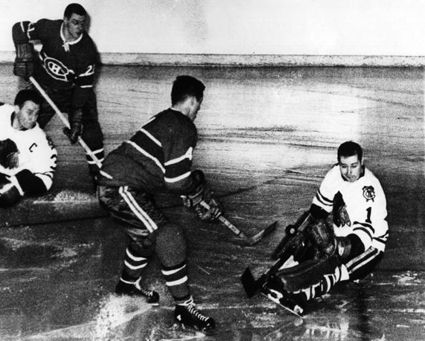
Chicago's Glenn Hall turns back an attack from Jean Beliveau
during their 1962 Semifinal playoff series
Having seen quite enough at this point, Kilander left his seat and made his way down to the lobby where the Cup was on display. Accounts differ as to whether he smashed the glass of the case, simply opened the case. The caption of a United Press International photo states that Kilander was able to pick the lock of the display case. The truth lies somewhere in the middle, as, finding himself nearly alone with the trophy, he pushed on the glass door, putting pressure on the insufficient lock, which easily popped open.
"I couldn't resist reaching in and taking the Cup in my arms," he said. "Who knew when I'd ever see it again. The Cup meant everything to me."
There is no confusion about what happened next, as Kilander liberated the Stanley Cup from it's display case and he made a dash to the nearest exit out of Chicago Stadium.
An alert 16-year-old usher Roy Perrell stopped him and asked him what he was doing. "I'm taking the cup back to Montreal where it belongs," a determined Kilander responded! Perrell yelled as Kilander continued toward the doors. Police officer Sgt. Jerry Kortapassi had little trouble identifying the culprit in possession of the four foot tall, 25 pound silver trophy. When Kilander repeated his intent to take the Cup back to Montreal, Kortapassi responded with "Only if you're Rocket Richard and I'm the Tooth Fairy," which put an end to Kilander's getaway attempt.
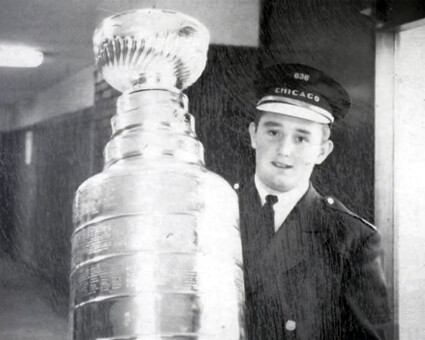
Alert usher Roy Perell, who alerted police that the Stanley Cup was being stolen by Ken Kilander, posing with the cup after its return to safety
Needless to say, Kilander found himself no longer in possession of his beloved Stanley Cup, but also standing in a Chicago Municipal Courtroom the next day face to face with Judge Hyam Feldman. The Black Hawks chose not to press charges of the cup, which at the time was valued at $8,000.
Also fortunate for Kilander was the decision to not charge him with bribery as well. He told the court his intentions were not to steal the cup, but take it to his Chicago hotel room, where he would be photographed and interviewed by the journalists from Montreal.
In the end, Judge Feldman fined him $10 and court costs for disorderly conduct as well as making him promise he would not try to steal the Cup again.
"He said to me, "You can go back to the Stadium tomorrow night and cheer all you want for your Canadiens, but the Cup stays here unless the Black Hawks lose, which I doubt very much they will," related Kilander about his conversation with Judge Feldman.
Despite Kilander's failure to deliver the Cup to the LaSalle Hotel, the Montreal journalists came through on their end of the deal, as the story of his attempted theft of hockey's greatest prize was splashed across North American sports pages the following day.
Chicago did hold on to win Game 3 on April Fools' Day, evened the series at two games apiece with a 5-3 victory in Game 4 on April 3rd. They then took Game 5 back in Montreal 4-3 before eliminating the favored Canadiens by shutting them out 2-0 in Game 6 to win four straight after having lost the first two, perhaps inspired by Kilander's attempt to liberate the Stanley Cup from their possession!
Looking back on the episode later in life, Kilander recalled, "I know what I did wasn't right, but I wanted the Canadiens to win so badly. I collected enough clipping from that incident to fill a scrapbook."
In the end, neither Kilander, Montreal or Chicago ended up with the coveted trophy, as the other Semifinal playoff series saw Toronto defeat the Rangers 4-2 and then the Maple Leafs went on to defeat Chicago 4 games to 2 to win the nearly stolen Stanley Cup.
Today's featured jersey is a 1961-62 Chicago Black Hawks Stan Mikita jersey. This style of Black Hawks jersey, so revered today and often topping "Best Jersey" lists, came into being for the 1955-56 season, replacing Chicago's previous barberpole style.
The 1955-56 version had no sleeve numbers and a slightly different main crest design before the logo changed to today's more familiar version and sleeve numbers were added in 1957-58. Note today's jersey has two sleeve stripes and long black cuffs, which were changed to three stripes to match the waist striping for the 1963-64 season.
Bonus jersey: Today's bonus jersey is a 1961-62 Montreal Canadiens Doug Harvey jersey. The Canadiens would first adopt a red sweater with a blue band as far back as 1912-13 in order to differentiate their barberpole style jersey from that of the Ottawa Senators, five years before the formation of the NHL.
Today's video section begins with the Secret Life of the Stanley Cup, featuring keeper if the cup Mike Bolt.
Apparently the Stanley Cup has gone missing once again...

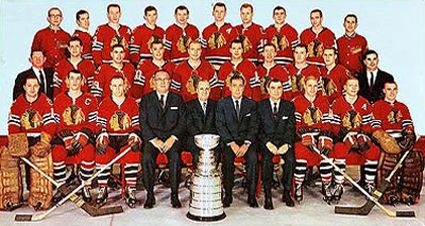
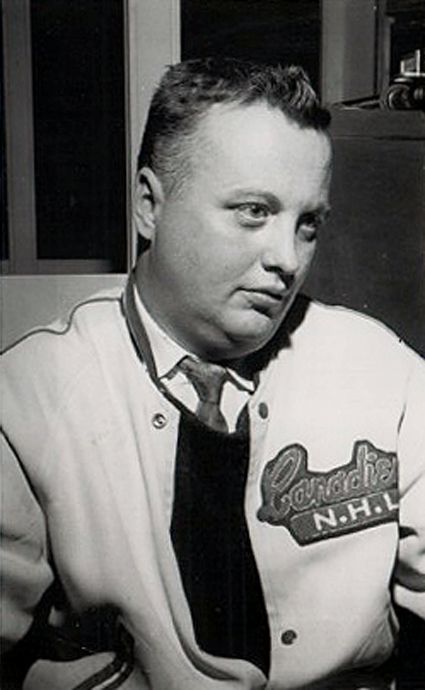
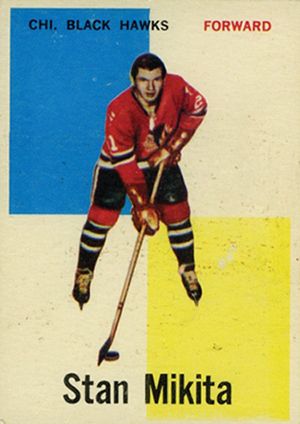
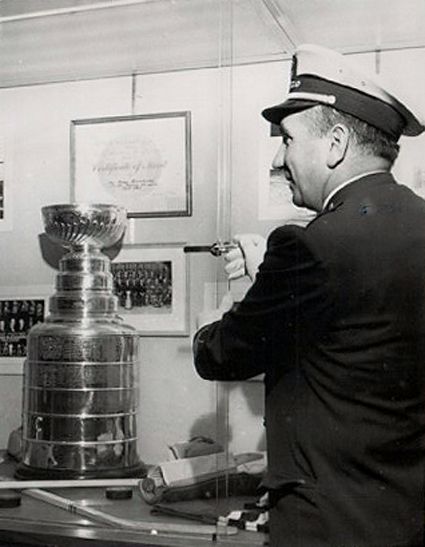
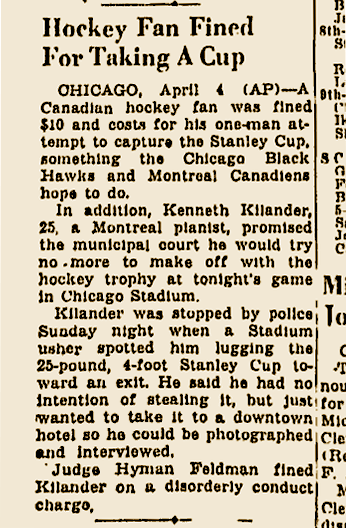
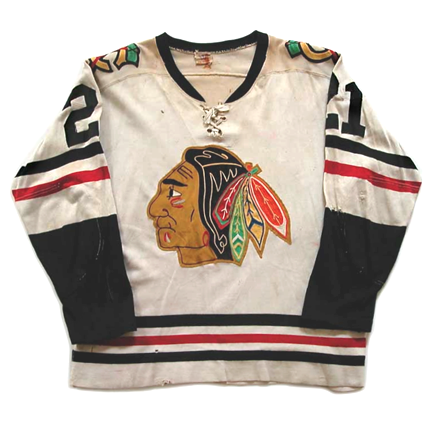
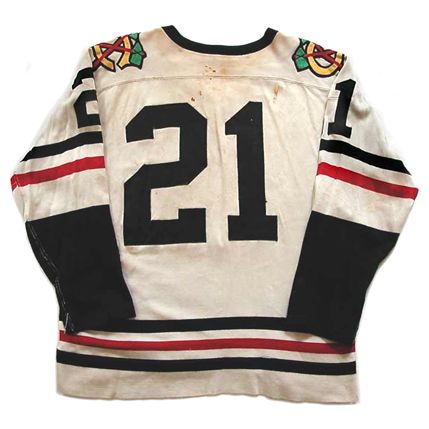
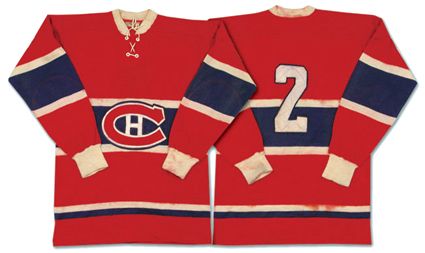










No comments:
Post a Comment
We welcome and encourage genuine comments and corrections from our readers. Please no spam. It will not be approved and never seen.